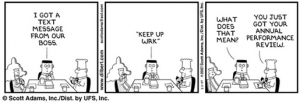Student
Entrepreneurial Success through Mentorship

In researching mentorship in the startup culture, I located a Forbes magazine article entitled “Why Entrepreneurs Need Good Mentors.” According to the author, a key benefit of having an accessible and knowledgeable mentor is that he or she can help you make good decisions more quickly; particularly in a startup situation, it is better to make a good decision sooner rather than a perfect decision later.
In addition to accessibility which permits prompt feedback, a good mentor should have “expert-level” experience, preferably as an entrepreneur, as well as a “direct yet supportive” feedback style. This latter point relates to our discussion in class about what makes a strong performance review: it is important that performance issues, whether of an employee or of an entrepreneur, be identified so that corrective action can be taken, but it is also important to make criticisms constructive. It is just as valuable to point out strengths as it is to point out weaknesses.
With the author’s points in mind, how do you feel your meetings with your mentor will guide your project’s direction? Also, what connections can you draw between your mentor’s experiences and your project?
Performance Reviews: Why Bother?

This article regarding performance reviews says that reviews a few times a year are meaningless. It states that company performance reviews should be like that of sports teams, immediate feedback as opposed to every quarter as was discussed in class. While quarterly reviews are better than annual reviews, too much time will have passed when quarterly reviews are given. The feedback to employees should be immediate so that they can modify their behavior so as not to waste company resources.
It goes on to say that the purpose of the performance review isn’t for the benefit of the employee, but rather for the company. In many cases, it provides written documentation of your failings so that if need be, they can fire you and cite the poor reviews as the reasoning. Even HR managers dislike performance reviews as shown by a 2010 Sibson Consulting study where 58% of managers disliked their own review systems.
While the article states that performance reviews are meaningless, it advocates the need for immediate feedback which is a less formal type of performance review. Do you think this model is better than what most companies have in place now? Or should companies do both, informal immediate feedback coupled with formal quarterly reviews?
Laziness and First Impressions: Barriers to Integrative Thinking

In this article, author Michael Michalko argues that cognitive laziness is one of the greatest barriers to integrative thinking. He points out that first impressions of problems, just like first impressions of people, are narrow and superficial. If this mentality is never changed, it prevents alternative ways of looking at the problem, meaning that integrative thinking will never surface. To remove any biases or assumptions resulting from a first impression, Michalko recommended taking Leonardo DaVinci’s advice: always look at a problem in at least three different ways in order to get a better understanding; or Sigmund Freud: “reframe” a problem in order to transform it and look at it from a different perspective.
This suggests patience. Unfortunately, laziness is inherently the result of impatience.
Thus, cognitive laziness becomes a barrier to entry, the entry point being integrative thinking. In order to gain a deeper understanding of a problem at hand, particularly in a business context, how does one motivate oneself or others in order to get rid of cognitive laziness? Getting rid of biases/assumptions is easier said than done. How would you go about this to achieve integrative thinking? Any thoughts?
How to Ace Your Performance Review
I know that I personally have always thought of performance reviews as uncomfortable sit-downs with the boss where I get talked at for a while, with little back and forth. I never thought that I had to play an active part in a review that was being conducted of me. However, the author of this Forbes article disagrees. She believes that one of the key aspects of a performance review should be you providing your own self-evaluation to your boss. Below are the steps that she says everyone should take to “ace their performance review.”
1. Don’t get overly emotional. It’s easy to take things personally, but try to keep things in perspective.
2. Prepare a self-evaluation throughout the year. Note all of your accomplishments and major contributions, as your boss is too busy to make note of every time you do something good.
3. Tell your boss where you need more support- this is also your chance to review your department.
4. Spell out your goals for the coming year. This will help you in next years review, as you can measure up against these goals.
5. Speak in plain English and avoid business jargon.
6. Handle criticism openly.
While most of the above are points that we have discussed, the self-evaluation concept is a new one. What are your thoughts on detailing all of your accomplishments throughout the year and listing them out to your boss? What’s the best way to go about t
A Real Rival to Cable TV…For a Price
PlayStation Vue Review: A Real Rival to Cable TV…For a Price – WSJ
Sony presents PlayStation Vue that allow the uses to stream live TV and DVR in the cloud. It is hard to really determine where Sony was going with this new idea seeing how it can touch so many companies and markets.
What market do you see this disruption falling under? Why?
With the price being so high I do not see how it would be able to push TiVo out of the picture, but it is the first real internet service to threaten cable TV. Vue allows you to also DVR to the cloud which means no more worrying about running out of storage. Pretty awesome innovation, and will be interested to see how PlayStation hones in on the application, price, and easy of use.
3D Printing: Consumer Revolution?

In this Forbes article, columnist Freddie Dawson discusses the topic of 3D printing and raises questions about how disruptive the technology really is. As Clayton Christenson has stated many times, a core tenet of an innovation being disruptive relies on its price point and accessibility; 3D printing has existed for a while, but it is starting to make headlines nowadays because of its continually decreasing price point (thus, expanding accessibility). The technology is still not cheap and can only make smaller objects using very specific substances (which is why there is controversy surrounding its level of disruption in the near-future), but one cannot deny that there is huge potential for disruption in the long-term future. Optimists in the business world are referring to this inevitable future as the “Consumer Revolution”, a time period in which the 3d printer will become a standard household object enabling the creativity in entrepreneurial individuals to produce almost any object they can think of, of any size and substance.
Questions to consider:
- If owning an affordable and versatile 3d printer is an inevitable reality, how disruptive do you think this will be to the retail, supply chain, and manufacturing sectors?
- Will 3D printing never become that disruptive, only becoming an alternate means of production?
- If users are able to “download” and “print” physical objects that normally would need to be shipped, do you think this could disrupt the online retailing industry and big-name giants such as Amazon?
- Some, including myself, would interpret this as owning the means to production, something that has always been privatized by large corporations in capitalism. With a more communistic foundation behind the technology, will this have adverse affects on capitalism in general?
- Furthermore, with the United States’ reliance on Eastern countries such as China for cheap labor and production, how do you think 3d printing could affect east-west relations and the global economy?
Regulatory Disruption
So I found this interesting article by Ron Klain, a high level aid in both the Obama and Clinton administrations. The article tackles start-ups up coming battle with regulators in Washington. As we discussed disruptive innovations in class one of the topics we touched on was the affect of laws on businesses. The upcoming debates in Washington have large ramifications in multiple industries. Some proposals run the risk of completely killing industries that are trying to get of the ground (like drones, and financial technology). Other possible laws in regards to privacy/cyber security and medical devices see new regulations of possibly exploding a new start-up craze.
http://techcrunch.com/2015/03/22/the-regulatory-fault-line-for-startups-moves-to-washington/
Here is the link to the article. What do you see happening in these fields? Are drones our future or are they too risky? Or after all the recent hacking headlines will the government crackdown and open a large cyber security market?
Can a Culture of 100% Honesty Work?
I thought this article was interesting, especially in light of the discussion of performance reviews yesterday. It looks at a few different companies and their initiatives toward creating completely honest and transparent workplaces. A survey by 15Five indicates that 85% of employees are unsatisfied with the quality of communication at work. On top of this, 81% of full-time U.S. employees would rather join a company with open communication over companies that offer perks such as top health plans and gym memberships.
New York Computer Help
-Joe Silverman (Owner) says “Our motto is total transparency, and I strive to promote this from the staff level through the customer.” Silverman enforces this by dismissing employees on the spot who start to cut corners, or withhold information from customers.
-This honesty is also important in terms of training: “Any time a repair comes in, we ask who hasn’t done this before. Whoever says no gets a crash-test training how to do it.”
Quirky
-Chief People Officer Rochelle DiRie distinguishes between transparency and honesty by saying “Transparency is the surfacing of data and events; honesty is about your interpretation and desires.”
-Both transparency and honesty are strongly enforced at Quirky from senior management down, and are also included in the company’s core values. This mentality also includes never hiding bad news. “We ask our employees to always state their opinions, even if controversial.”
How important do you guys think honesty and transparency in the workplace are? Are there scenarios where withholding bad news is the better choice?
Convincing Skeptical Employees to Adopt New Technology
 As MIS majors, understanding the value of new technologies and being able to adapt to them is something that we take for granted. However, within the workplace there is often complacency among employees with existing technology and even hesitancy/fear to acquiring new products and systems.
As MIS majors, understanding the value of new technologies and being able to adapt to them is something that we take for granted. However, within the workplace there is often complacency among employees with existing technology and even hesitancy/fear to acquiring new products and systems.
https://hbr.org/2015/03/convincing-skeptical-employees-to-adopt-new-technology
In a study by MIT Sloan Management Review, 63% of managers said that the pace of technological change is too slow, due to a lack of urgency and poor communication of the benefits of new tools. Rebecca Knight of Harvard Business Review offers managers some advice for overcoming these obstacles with their employees:
1) Choose Technology Wisely: Bear your teams interest in mind. “Functionality is critical, but so is user-friendliness.”
2) State Your Case: Put forth a compelling vision of what the technology is and what it’s going to do.
3) Customize Training: Training efforts should reflect differences in familiarity and interest in technology; don’t be afraid to ask them what they want in a training.
4) Get Influencers Onboard: Create a “Network of Champions” fully invested in the new technology.
5) Make it Routine: “Implicity raise the cost of not using the new technology,” so they’re pushed towards routinely using the new tools.
6) Highlight Quick Wins: Draw attention to positive impacts.
7) Make it Fun: Reward the behavior you want to see (i.e. compensation, perks, recognition etc.)
8) Consider Penalties: Possibly penalize resistors for non-use.
With Windows 10, Your Face Will Be Your Password

http://techcrunch.com/2015/03/17/your-windows-10-password-will-be-your-face/#9tKYA4:KAm2
With Windows 10 right around the corner, Microsoft just Windows Hello. If your computer has the right hardware (being Intel’s RealSense camera), your login password can be your face. It will also be used to unlock a number of online services and applications that are linked to your account. It’s not clear as to how accurate or secure this will be (i.e. What if I just print a picture of a person’s face? Would that allow me to sign in?). If done right, though, then this will probably be a popular and secure feature.
While this in particular may not be disrupting any markets (it’s just a password), it gives a glimpse into how this sort of technology will change the way we access hardware and software, and has great implications for the security industry. For example, imagine if this technology were used in order to gain access to your home. There would be a camera at your door, and the door would unlock only if it recognized your face as being a resident of the house. By bring Microsoft Hello to computers, it will help spread awareness of autonomous technology and the benefits of it.
What do you guys think about this? Is this a good or bad idea? Can you think of any other autonomous technologies could be effectively implemented on personal computers? I personally think this can be a good thing if Microsoft is able to make the software really smart at detecting actual faces from fake ones. However, I don’t think it makes sense to make your face the password. It would make more sense to have your face be the username, or at least a security measure to gaining access to your username.





